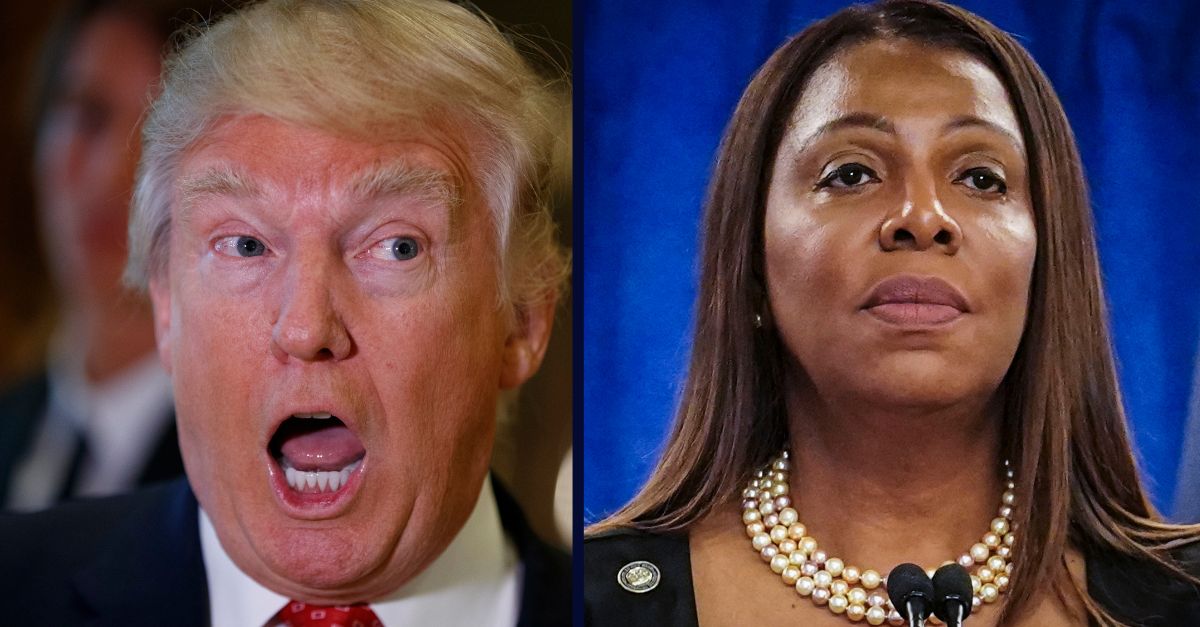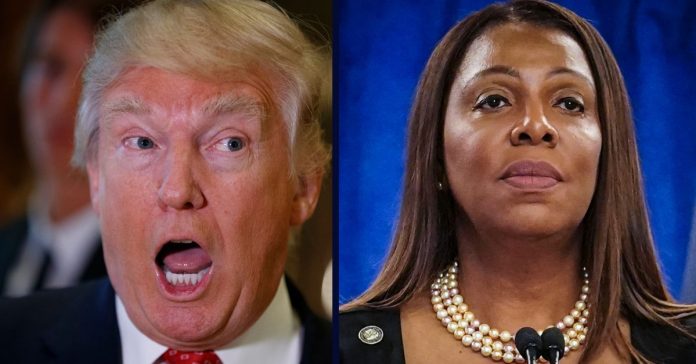
Left: President-elect Donald Trump speaks with reporters after meeting French businessman Bernard Arnault at Trump Tower in New York, Monday, Jan. 9, 2017. (AP Photo/Evan Vucci). Right: New York Attorney General Letitia James speaks during a press briefing, Friday, Feb. 16, 2024, in New York. (AP Photo/Bebeto Matthews)
Donald Trump only a week ago posted an $91.63 million bond in New York to pay the writer he defamed and sexually abused — and now that he has shown he can shore up huge sums of money, New York State Attorney General Letitia James has zeroed in on the $464 million civil fraud fine the former president has so far tried to avoid paying.
As Law&Crime previously reported, Trump recently asked if he could post just a portion of the $464 million penalty — or none of it at all — as he sought a stay on appeal.
He argued it would be “impossible” for him to generate the funding without conditions, including a temporary lift on a ban of his doing business in the Empire State in order to find the money and asked permission to post just $100 million up front.
Before filing her 132-page memorandum opposing Trump’s motion for a stay on Monday, James had already broadcast that if the former president claimed he was unable to repay the people of New York, then she would begin seizing his assets, including the Trump Building at 40 Wall Street.
When Trump lost his gambit to stay enforcement of the fine when the matter was before New York Supreme Court Justice Arthur Engoron, the justice told the ex-president’s defense lawyers in February: “You have failed to explain, much less justify, any basis for a stay.”
Weeks later, nothing has changed, according to James.
“Defendants fail to provide any support for their unsubstantiated claim that posting a bond or depositing funds is ‘impossible’ absent a sale of properties,” James wrote Monday.
Trump and his co-defendants have “not come close to demonstrating” why they would be entitled to the extraordinary the relief they seek, she argued. Further, state law dictates that an automatic stay requires posting of an appeal bond or a depositing of funds with the trial court in an amount that would satisfy the entire judgment if the appeal was unsuccessful, James noted.
Trump’s “self-selected” offer doesn’t even represent a quarter of what he owes plus interest, James wrote. She also said that there hasn’t been any information offered up from Trump or his co-defendants about what they plan to do to secure funding.
“For instance, defendants have labeled Mr. Trump ‘a multi-billionaire’ yet have not affirmed that they approached sureties with his supposed net worth and assets and were in fact unable to obtain a bond. Similarly, defendants contend that Mr. Trump’s interest in his 40 Wall Street property ‘is likely alone sufficient to satisfy any judgment’ yet have not affirmed that sureties have refused to accept this property, his other real-estate interests, or his private jets or helicopters as collateral for an appeal bond,” James wrote.
And while Trump’s attorneys once seemed to argue that an appeal bond would require Trump and his co-defendants to provide the full amount in cash to a surety, he still has not explained why he could not provide that same surety with a irrevocable letter of credit or real estate-backed securities, James argued.
The state attorney general also expressed concern to the court over the fluctuation of Trump’s financial circumstances. They are changing practically daily as he faces down indictments in numerous venues, she said. If he is allowed to stay the civil fraud fine on appeal, it will only make it more difficult later to collect, she argued.
“Moreover, there is significant risk that absent a full bond or deposit, defendants will attempt to evade enforcement of the judgment or to make enforcement more difficult after an appeal. Notwithstanding the independent monitor that they now tout, in November 2023, defendants failed to disclose tax returns for six Trump Organization entities and transferred $40 million in cash (including $29 million to Mr. Trump) without informing the monitor beforehand, in violation of Supreme Court’s orders,” James wrote.
After the court issued its post-trial decision, James added, Trump and his co-defendants announced for the first time that they had numerous entities “operating in New York [that] are allegedly now located on a golf club in Florida.”
“Defendants attempted that relocation even as they claim to this court that those assets ‘cannot be summarily disposed of or secreted out of the jurisdiction,”” the motion states.
Trump’s hush money criminal trial — in which he is accused of paying for adult actress Stormy Daniels‘ silence about their affair ahead of the 2016 presidential election — kicks off in New York on March 25. It will be a significant day for the former president: It is also the deadline for him to post no less 110% of the bond in the civil fraud case, as Bloomberg noted this week.
James also asked the appeals court not to stay enforcement of other injunctive relief, pursuant to requests by Trump and his co-defendants, including prohibitions on the Trump Organization applying for loans for three years, a ban on defendants acting as officers or directors of New York businesses for two to three years and a permanent ban on Trump’s onetime chief financial officer Allen Weisselberg and former corporate controller Jeffrey McConney from serving in any sort of financial managerial roles in the state.
“Defendant’s financial interests in obtaining new loans or particular jobs are outweighed by the need to protect the public interest from those who, like defendants here, have engaged in repeated and persistent misconduct,” James wrote.
The filing also underlines how the attorney general is confident that Trump’s overarching appeal will fail.
Some 40 witnesses testified for 11 weeks and when Engoron issued his 92-page post-trial opinion explaining why “document after document and witness after witness” had made it abundantly clear that Trump’s statements were “rife with blatant malpresentations and omissions,” his chance and cause for a successful appeal died then, she argued.
If, however, the court finds differently and deems that any stay of relief is warranted, including a partial stay of just a particular portion of what is owed, the appeals court should move hastily, the state attorney general urged.
“In particular, the Court should set the appeal for the September 2024 Term,” the wrote. Moreover, given the sizable record generated by Supreme Court’s 11-week bench trial, the Court should require (i) defendants to perfect their appeal by June 3, 2024; (ii) OAG to file a respondent’s brief by August 1, 2024, and (iii) defendants to file any reply brief by August 22, 2024, to ensure that both parties have enough time to properly brief the appeal for that term.”
Have a tip we should know? [email protected]

